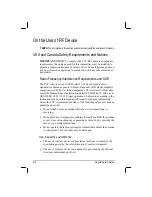
C-4
Hard Disk Encryption
A:
There are no “backdoors” into X-Wall LX secret systems, so without the
X-Wall Secret Key you will not be able to access the data or operating
system on the protected disk
. This means you must keep the backup key in a
safe place at all times.
Q:
If the X-Wall LX malfunctions, will I lose my data?
A:
No. Remember that the
X-Wall Secret Key
contains the DES/TDES secret key;
the
X-Wall LX
chip is a generic engine. Consequently, you can simply replace
the defective
X-Wall LX
component, if that ever occurs, and use your original
X-Wall Secret Key
to access the data on your hard drive.
Q:
What’s the likelihood an X-Wall LX malfunctions?
A: Every
X-Wall LX
family microchip we ship is 100% tested and proven and complies
with International quality assurance standards
1
. However, there may be
occasions that chip malfunctions after some period of time. This problem can be
resolved by simply replacing the defective
X-Wall LX
microchip. The contents of
the disk drive will NOT be lost as long as you retain the original
X-Wall Secret
Key
intact. Nevertheless, disk failures can occur, so it is good practice to always
keep a backup of your important data, for which we do have a good solution on
the back up device: Secret USB2.0. Please refer to our website for more details.
In case of system failure, please double-check with your disk drive prior to
reporting any malfunction of the
X-Wall
.
Q:
Can I exchange the X-Wall LX encrypted files using the public
network?
A:
No. The
X-Wall
system was specifically designed to protect
data “at rest”
(stored) on your PC. The DES/TDES encryption engine built inside the
X-Wall
LX
is a symmetric cipher, a
“Secret Key”
system that does NOT support the
Public Key Infrastructure (PKI). Therefore, you will not be able to exchange
X-Wall LX
encrypted files through public network, as every file leaving X-Wall
interface is the clear text.
Q:
Does X-Wall LX increase the original file size after encryption?
A:
No. DES/TDES is a complicated mathematical algorithm that computes the
original data with 40-bit key length. Regardless of the size of the encryption key,
the size of data file after encryption remains unchanged.
1
Our quality assurance program including reliability tests are performed in accordance with
MIL-STD-883E as the prime standard and with JEDEC-STD, where applicable. The JEDEC
(Joint Electronic Device Engineering Council) Solid State Technology Association is the
semiconductor engineering standardization body of the Electronic Industries Alliance (EIA),
a trade association that represents all areas of the electronics industry.
Summary of Contents for M220
Page 1: ...M220 Operation Manual Part Number 799001151001R00 24 Mar 062006 ...
Page 7: ...v European Union CE Marking and Compliance Notices B 9 ...
Page 8: ......
Page 11: ...M220 Operation Manual Part Number 799001151001R00 24 Mar 062006 ...
Page 17: ...v European Union CE Marking and Compliance Notices B 9 ...
Page 18: ......
Page 38: ...1 18 Getting Started ...
Page 65: ...Operating Your Computer 2 27 3 Click on Next to continue ...
Page 69: ...Operating Your Computer 2 31 ...
Page 88: ...Expanding Your Computer 4 9 Connect to IR device ...
Page 93: ...4 14 Expanding Your Computer ...
Page 98: ...Setup Configuration Utility SCU 5 5 Main Menu Date and Time ...
Page 100: ...Setup Configuration Utility SCU 5 7 Advanced Menu Geyserville Support ...
Page 104: ...Setup Configuration Utility SCU 5 11 Security Menu Power on Password ...
Page 107: ...5 14 Setup Configuration Utility SCU Boot Menu Boot Sequence ...
Page 110: ...Setup Configuration Utility SCU 5 17 ...
Page 116: ...6 6 Installing Software Drivers ...

































